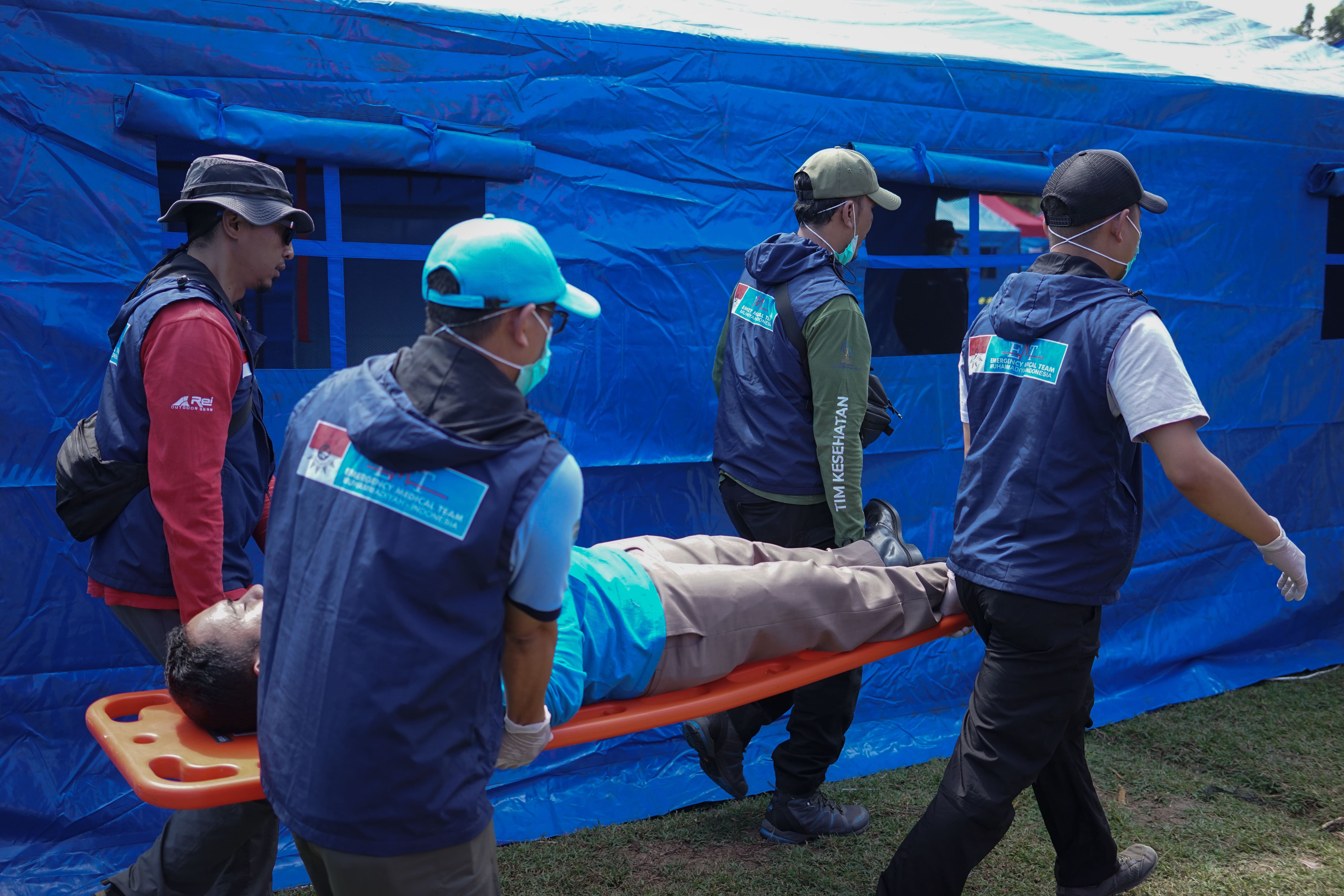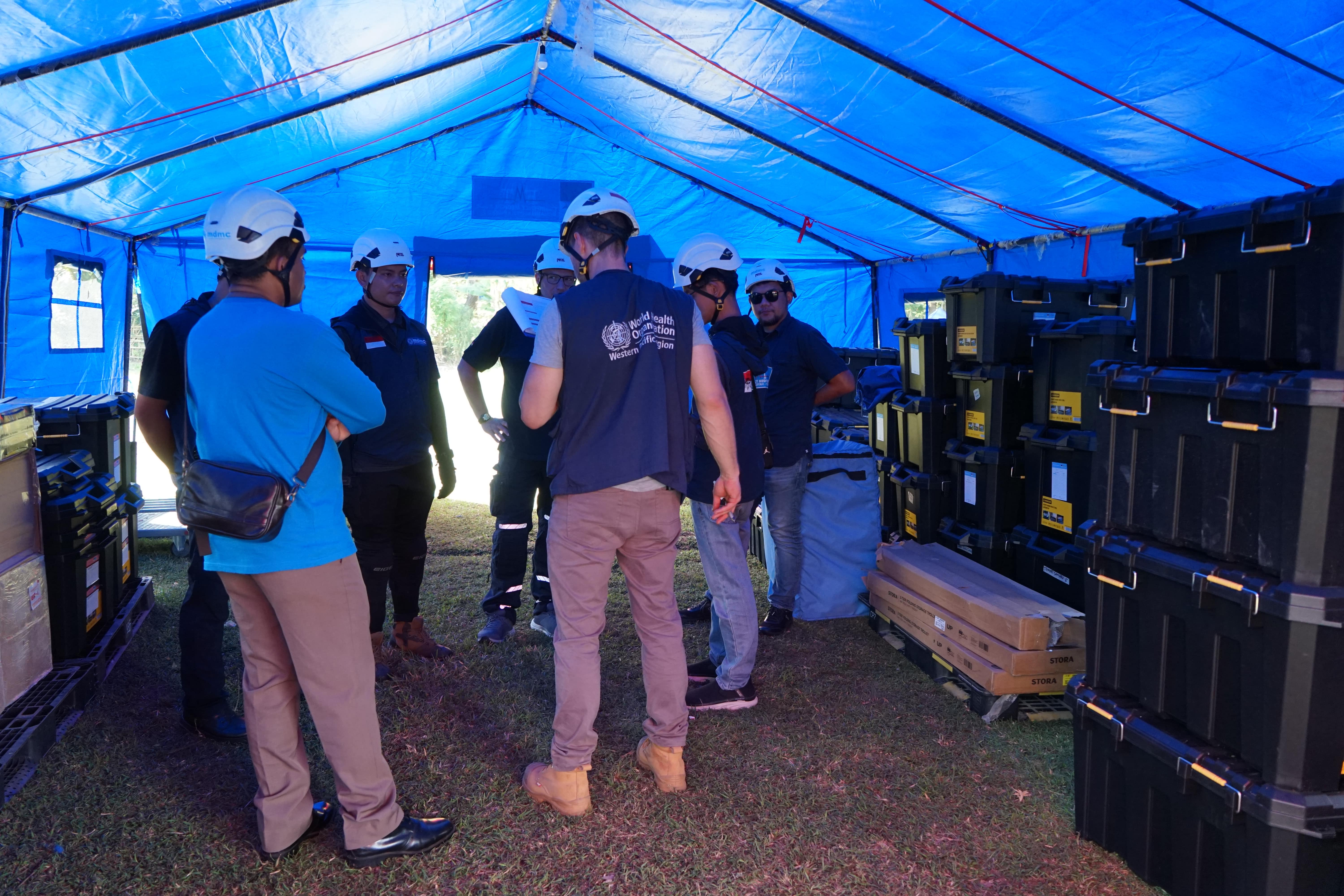On 8–10 July 2025 Muhammadiyah Emergency Medical Team (EMT) hosted a full-scale field simulation in Yogyakarta as part of its drive to achieve World Health Organization (WHO) classification – the international benchmark for quality, accountability and self-sufficiency in emergency medical response. The exercise marked a key milestone in Muhammadiyah EMT’s partnership with the WHO-classified German EMT International Search and Rescue Germany and the Robert Koch Institute, funded by the Global Health Protection Programme.
Over three days, more than 30 Muhammadiyah volunteers conducted rapid deployment drills, setting up a Type 1 Fixed EMT field hospital and responding to simulated mass casualty incidents and trauma scenarios – including cases with combined medical and mental health needs – while also delivering real health services to the local community in Kulon Progo. Experts from the WHO Regional Office for the Western Pacific (WPRO), mentors from the Australian Medical Assistance Team and observers from other Indonesian EMTs provided technical feedback on clinical protocols; water, sanitation and hygiene systems; logistics and mental health and psychosocial support.
“This exercise helped us clearly identify areas we still need to improve, including logistics, communication flow, patient care procedures and developing clear Standard Operating Procedures,” said Dr Eva Delsi, Sp.EM, field hospital coordinator for Muhammadiyah EMT. “It allows us to be better prepared for the classification process and future deployments.”

Muhammadiyah EMT personnel carry out a patient evacuation drill during the field hospital simulation, demonstrating coordination and response capacity in emergency situations. Credit: WHO/Fieni Aprilia
The simulation followed a 7 July engagement meeting in Jakarta where WHO Indonesia and WHO WPRO met with national EMT actors – among them Bulan Sabit Merah Indonesia, Mercy Corps Indonesia, the Ministry of Health’s Center for Health Crisis, and Muhammadiyah Disaster Management Center – to strengthen networks, share technical guidance and advance EMT development. Discussions also covered the Ministry’s plans for a national health reserve workforce (Tenaga Cadangan Kesehatan) and multi-hazard monitoring operations.
WHO’s EMT classification process ensures that emergency medical teams can deploy rapidly, operate independently and deliver high-quality care during health crises. Muhammadiyah EMT is one of seven Indonesian teams currently working towards classification, with the aim of supporting both domestic and international response efforts.

WHO WPRO team provides technical input on warehouse tent setup during the simulation, ensuring alignment with WHO logistics standards for EMTs. Credit: WHO/Fieni Aprilia
The activity was part of the broader project “Continued Strengthening of Emergency Medical Team Readiness, Response and Coordination in the Indo-Pacific,” funded by the Australian Department of Foreign Affairs and Trade. By building capacity and fostering peer-to-peer learning, these efforts strengthen Indonesia’s readiness to respond to emergencies at home and contribute to regional and global EMT deployments.
“Indonesia’s EMT network is advancing quickly, thanks to strong collaboration between national actors and international partners,” said Tamara Curtin Niemi, Team Lead for Health Emergencies, WHO Indonesia. “Through training, exercises and technical support, Indonesia is reinforcing its ability to provide timely, effective and coordinated emergency health services in any crisis.”
Through strong global and national partnerships, WHO will continue to support Muhammadiyah EMT and other Indonesian teams to enhance emergency response, reinforce health system resilience, and deliver life-saving care when disasters strike.
This activity was supported by Germany’s Global Health Protection Programme, the Robert Koch Institute and Australia’s Department of Foreign Affairs and Trade, with technical guidance from International Search and Rescue Germany and the Australian Medical Assistance Team/Australian National Critical Care & Trauma Response Centre.
Written by Lintang Sibarani, National Professional Officer (Emergency and Humanitarian Action), and Febi Putri, National Professional Officer (Health Emergencies), WHO Indonesia
